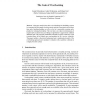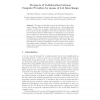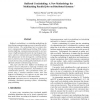474 search results - page 6 / 95 » Search-based Job Scheduling for Parallel Computer Workloads |
122
Voted
ICPADS
2006
IEEE
15 years 8 months ago
2006
IEEE
Multi-cluster schedulers can dramatically improve average job turn-around time performance by making use of fragmented node resources available throughout the grid. By carefully m...
111
click to vote
JSSPP
2009
Springer
15 years 9 months ago
2009
Springer
This paper analyzes the effect of overbooking for scheduling systems in a commercial environment. In this scenario each job is associated with a release time and a finishing deadl...
JSSPP
2007
Springer
15 years 8 months ago
2007
Springer
Abstract. This paper empirically explores the advantages of the collaboration between different parallel compute sites in a decentralized grid scenario. To this end, we assume ind...
136
click to vote
JSSPP
2009
Springer
15 years 9 months ago
2009
Springer
Abstract. As multi-core processors proliferate, it has become more important than ever to ensure efficient execution of parallel jobs on multiprocessor systems. In this paper, we s...
103
Voted
IPPS
2000
IEEE
15 years 6 months ago
2000
IEEE
Buffered coscheduling is a scheduling methodology for time-sharing communicating processes in parallel and distributed systems. The methodology has two primary features: communica...



